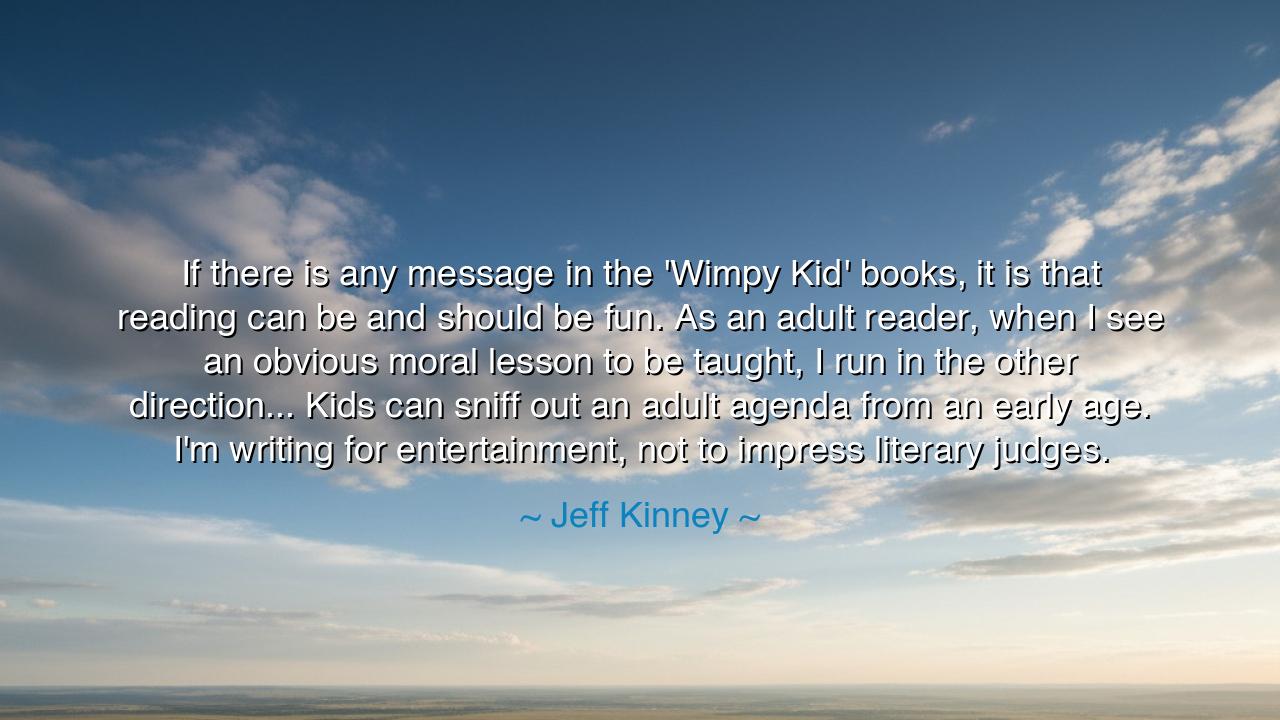
If there is any message in the 'Wimpy Kid' books, it is that
If there is any message in the 'Wimpy Kid' books, it is that reading can be and should be fun. As an adult reader, when I see an obvious moral lesson to be taught, I run in the other direction... Kids can sniff out an adult agenda from an early age. I'm writing for entertainment, not to impress literary judges.






"If there is any message in the 'Wimpy Kid' books, it is that reading can be and should be fun. As an adult reader, when I see an obvious moral lesson to be taught, I run in the other direction... Kids can sniff out an adult agenda from an early age. I'm writing for entertainment, not to impress literary judges." — thus spoke Jeff Kinney, the humble architect of laughter, who through the misadventures of a boy named Greg Heffley, rekindled the joy of reading in a generation distracted by screens. In these words lies not only a reflection on writing, but a philosophy of teaching, childhood, and truth. Kinney reminds us that the most powerful lessons are not preached, but lived — that to reach the heart, one must first awaken delight.
In the style of the ancients, one might say: The mind that laughs is open; the heart that is entertained is ready to receive wisdom. Jeff Kinney, who began Diary of a Wimpy Kid as an online experiment, found himself at the crossroads between education and amusement. The world of children’s literature, too often burdened by adult intention, had become a place of moral sermons disguised as stories. But Kinney chose a different path — that of honesty and humor. He understood that children, though small in stature, possess great instinct. They can sense when they are being lectured, when joy has been replaced by duty. And so, he resolved that his books would carry no agenda, no forced virtue — only the truth of growing up, told through laughter, awkwardness, and imperfection.
There is deep wisdom in his approach. For what are stories, if not mirrors of our humanity? The ancients knew this: Aesop, with his fables, taught through wit and charm, not through scolding. His tales of foxes and crows live on not because they preached, but because they delighted. The lesson was hidden in laughter — and that is why it endured. Kinney, in his own time, continues this sacred tradition. His "Wimpy Kid" stories are not classrooms of morality but playgrounds of truth, where children can laugh at their own fears, see themselves in their mistakes, and learn — not because they are told to, but because they want to.
The essence of his quote — that reading should be fun — carries a larger message about the nature of education and inspiration. True learning, he suggests, is born of curiosity, not compulsion. When we teach through joy, we teach for life. When we demand obedience through dullness, we lose both the child’s interest and their spirit. This is a truth as old as the philosopher’s torch — that wisdom cannot be forced; it must be invited. To make a child love reading, one must first make them laugh. For laughter, like music, opens the gate to the soul.
Consider the example of Mark Twain, the master of American wit. His stories, filled with mischief and humor, were once dismissed by scholars for lacking “moral weight.” Yet it was Twain, not the moralists, whose words endured. In Tom Sawyer and Huckleberry Finn, he captured the living truth of youth — its rebellion, its kindness, its confusion. And in doing so, he taught more about conscience, courage, and freedom than a thousand sermons ever could. So too does Jeff Kinney stand among those writers who understand that joy is not the enemy of wisdom, but its herald.
Kinney’s wisdom also speaks to the modern artist and educator alike: that to entertain is not to trivialize, but to dignify the imagination. The adult who forgets the value of play forgets how to teach, how to create, and how to love. When he says he writes “not to impress literary judges,” he reminds us that art is not made for trophies but for hearts. The child reader, who finds comfort and laughter in a story, is a far greater judge than any critic — for in their laughter lives the promise of another generation that still believes in wonder.
And so, my child, take this lesson from Jeff Kinney: do not seek to instruct before you inspire. Whether you are a teacher, parent, artist, or friend, remember that joy is the gateway to understanding. Let your words, your work, your life be filled with authenticity, not performance. Make others smile, not because you must, but because you may. For when the child — or the child within you — learns that reading can be fun, that life can be joyful, and that wisdom need not be heavy, you have already given the greatest lesson of all: that truth, when wrapped in laughter, never grows old.






AAdministratorAdministrator
Welcome, honored guests. Please leave a comment, we will respond soon